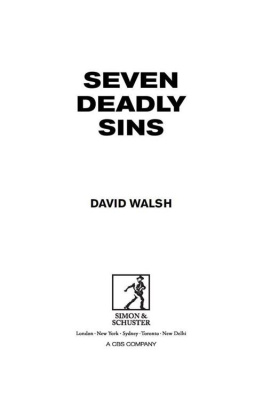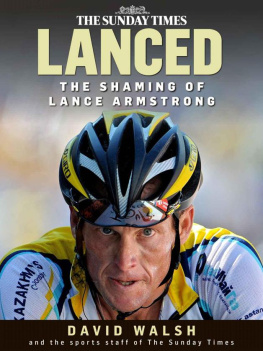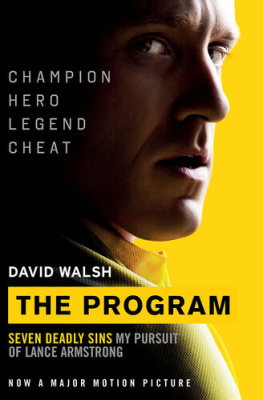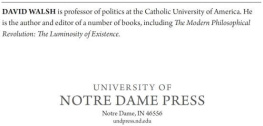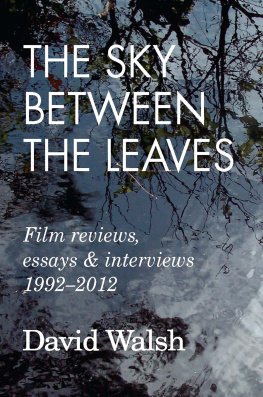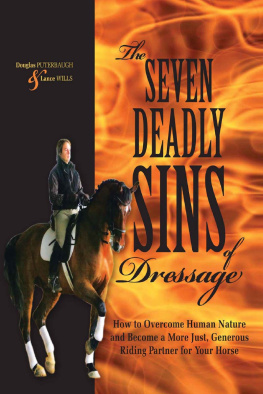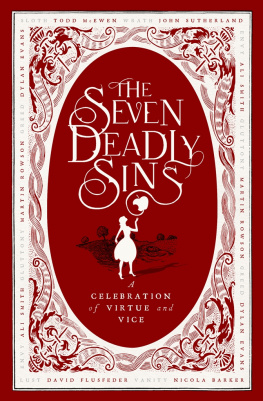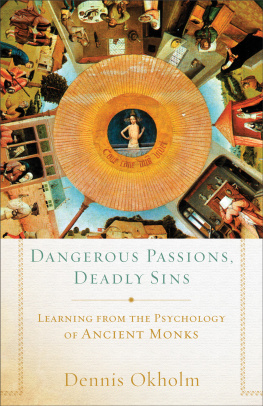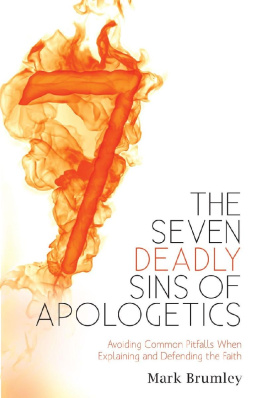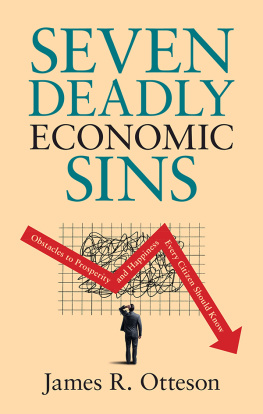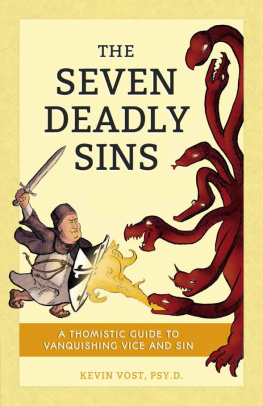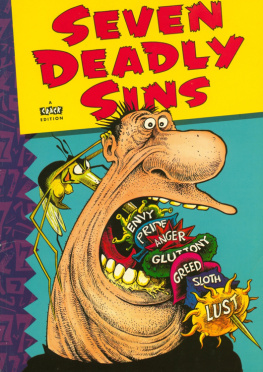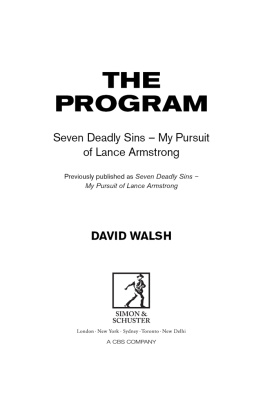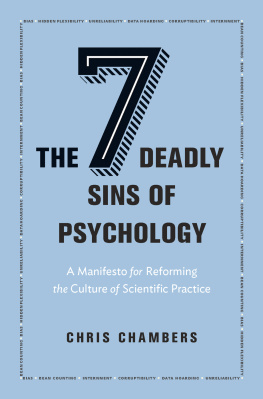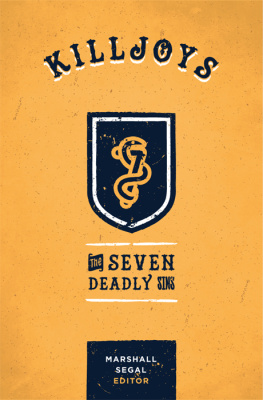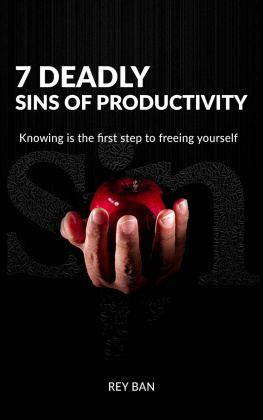David Walsh - Seven Deadly Sins
Here you can read online David Walsh - Seven Deadly Sins full text of the book (entire story) in english for free. Download pdf and epub, get meaning, cover and reviews about this ebook. publisher: Simon & Schuster, genre: Detective and thriller. Description of the work, (preface) as well as reviews are available. Best literature library LitArk.com created for fans of good reading and offers a wide selection of genres:
Romance novel
Science fiction
Adventure
Detective
Science
History
Home and family
Prose
Art
Politics
Computer
Non-fiction
Religion
Business
Children
Humor
Choose a favorite category and find really read worthwhile books. Enjoy immersion in the world of imagination, feel the emotions of the characters or learn something new for yourself, make an fascinating discovery.
- Book:Seven Deadly Sins
- Author:
- Publisher:Simon & Schuster
- Genre:
- Rating:4 / 5
- Favourites:Add to favourites
- Your mark:
- 80
- 1
- 2
- 3
- 4
- 5
Seven Deadly Sins: summary, description and annotation
We offer to read an annotation, description, summary or preface (depends on what the author of the book "Seven Deadly Sins" wrote himself). If you haven't found the necessary information about the book — write in the comments, we will try to find it.
Seven Deadly Sins — read online for free the complete book (whole text) full work
Below is the text of the book, divided by pages. System saving the place of the last page read, allows you to conveniently read the book "Seven Deadly Sins" online for free, without having to search again every time where you left off. Put a bookmark, and you can go to the page where you finished reading at any time.
Font size:
Interval:
Bookmark:

For John, his brothers, his sisters and mum
I watch the Olympic Games but I dont bother to remember the names of the athletes any more. Its like theatre but I prefer the theatre because the relationship between actor and spectator is clear. In sports theatre, both are still pretending its real.
Sandro Donati
Youre no messiah. Youre a movie of the week. Youre a fucking T-shirt, at best.
Brad Pitt, Se7en
Finally, the last thing, Ill say to the people who dont believe in cycling, the cynics and the sceptics: Im sorry for you. Im sorry that you cant dream big. Im sorry you dont believe in miracles.
Lance Armstrong, 2005 Tour de France victory speech
Le grand depart.
My first conversation with Lance Armstrong was in the garden of the Chateau de la Commanderie hotel about ten miles south of Grenoble. This was late afternoon on Tuesday 13 July 1993, a rest day on the Tour de France, and with its trees and shrubs, its wrought-iron chairs and tables overlooking the swimming pool, the setting couldnt have been much better.
At a nearby table Armstrongs teammate Andy Hampsten sat with some friends. A little further away another journalist interviewed the teams Colombian climber, lvaro Meja. Armstrong and I sat in the shade and spoke for more than three hours. He did most of the talking, but then he had much to say and I had a book to write.
It was the force of his personality that struck you the most: like a wave crashing forward and carrying you with him. Twenty-one years old but he wasnt like most young men of that age. If he had been, he would have talked about the thrill of riding his first Tour de France. Most young sportsmen know the clichs that we like to see recycled. He didnt mention the thrill or the honour, nothing even close. Hed been told by the team bosses he was at this Tour to learn for the future, but he didnt see the good in that. He wanted to win right now. I am Lance Armstrong, youre gonna remember my name. As he machine-gunned his way through his past and speeded into the future, he had me at his side, and on his side.
Youve got to see this kid, I said over dinner to my friend, fellow journalist and former Tour rider Paul Kimmage, that evening.
Why?
He is different. Hes got this desire. Hes going to win a lot of races, and hes so open. Wait til you meet him.
You always get too enthusiastic, Kimmage said.
Eleven years earlier, Id turned up at the Tour de France for the first time and fallen in love. The man-crush is a hazard of life for the sportswriter. That debut trip covered just the last two race days in 1982; the boat from Rosslare in the south-east of Ireland to Le Havre, a car drive to pick up the penultimate stage and then on into Paris for the race to the Champs-lyses. I travelled with four people from Carrick-on-Suir, the home town of Sean Kelly, who was then one of the worlds best cyclists. Kellys fiance Linda Grant was part of our group, as was her father Dan, and local shopkeeper Jim OKeeffe. Professional cycling wasnt big news in Ireland then, and if Kelly managed to win a stage in the Tour de France, the result just about made it onto a sports page. Down in Carrick-on-Suir, OKeeffe was ahead of the rest of us because he knew how to tune his radio into some French station that gave regular updates from the Tour, and if the local hero did well, the local shopkeeper knew it first.
One afternoon OKeeffe caught news of Kelly winning a stage at the Tour, it might have been the leg to Thonon in 1981. Beside himself with joy he left his shop and just walked down Main Street hoping to meet someone he could tell. Coming in the opposite direction was Kellys Uncle Neddy, wheeling his bicycle.
Neddy, said OKeeffe, youre not going to believe this. Im just after hearing Sean won todays stage in the Tour de France.
Taking a second to digest the news, Neddy replied, Why wouldnt he win, he does nothin else except cycle that bike.
Telling Irish people that they had produced a world-class athlete called Sean Kelly became my first crusade. But in terms of the Irish attitude to Kellys prowess, things didnt change quickly, and the following year I could get to the Tour de France only by taking two weeks holidays and the considerable risk of travelling on the back of Tony Kellys BMW 1000 motorbike. On a clear road Tony could get that baby up to 130 mph, and whatever happened, I knew it wouldnt take long. We saw Kelly take the yellow jersey in Pau, found a cheap restaurant and toasted his achievement with a bottle of wine.
Stephen Roche, our other countryman in the race, had the white jersey for the leading young rider and that evening in the Basque city we felt proudly Irish, members of a privileged elite. Next day we waited on the Col de Peyresourde and measured the scale of disaster by the minutes Kelly and Roche lost to the new leaders. As hard as it was to see your men wither in the mountains, it was impossible not to be captivated by the great race beyond them. The Tour thrilled me like no other sporting event, and no sooner had Tony returned me to Dublin I was talking to my wife about how good it would be to move to France. So in 1984 Paris became home and I got to follow most of the great races on the cycling calendar.
One experience begot another until, in early 1993, I agreed with the UK publishers Stanley Paul to write a book about the Tour de France, a series of stories from the three-week pilgrimage around France that I envisaged as a Canterbury Tales in lycra. At the beginning would be the story of the rookie, the kid in his first Tour: hed be starry-eyed and about to have his senses overwhelmed and his body wasted. Armstrong was the obvious choice, the youngest rider in the race but also the newcomer with expectations on his shoulders. Perfect.
I dont know about Lance but I was pumped and ready. He had agreed to do the piece and arranged for me to come to the Motorola team hotel in Bourgenay on the evening after the opening prologue.
I turned up at Les Jardins de lAtlantique but was met by Jim Ochowicz, his team manager, who told me that Lance felt down after his disappointing ride in that days prologue. The rider wanted to know if we could do the interview sometime later, perhaps on the Tours scheduled rest day. I agreed but continued to observe him for my background notes. I watched him in the tented village at Avranches on the sixth morning as an Italian journalist tried to interview him. He wasnt rude, but the moment two attractive French girls passed by in their short skirts it was clear they interested him far more than the questions. Human, I thought.
So here I am in the Chateau de la Commanderie, sitting down with a young man who will be a central part of my life for almost the next twenty years. He doesnt exude the sense that this will be the start of a beautiful friendship, but thats okay. Meanwhile I want to know everything about him.
His biological father?
I never met him. Ah, I guess I met him but I was a one-year-old at that point. Thats when he left.
The stepfather he never liked?
When I was young I got along with him all right. You dont know how to dislike somebody at that age, but I tell you, the first day I learned to dislike somebody, I disliked him.
Phew! Whatever happened to Moms apple pie and starry-eyed rookies?
He tells about the impact on him of his mum and stepdad splitting up. When youre growing up, youre fourteen, fifteen or sixteen and youre in high school, or whatever, your friends parents are getting divorced and the kids are falling apart. They start crying, they get upset, all of this. And my stepfather has left and I had a party, you know, because its such a load off my back. I got confused because I thought, Well, man, what is wrong with you? This tears kids up and yet were kicking this guy out and youre ecstatic. For a while I thought maybe somethings wrong with me.
Next pageFont size:
Interval:
Bookmark:
Similar books «Seven Deadly Sins»
Look at similar books to Seven Deadly Sins. We have selected literature similar in name and meaning in the hope of providing readers with more options to find new, interesting, not yet read works.
Discussion, reviews of the book Seven Deadly Sins and just readers' own opinions. Leave your comments, write what you think about the work, its meaning or the main characters. Specify what exactly you liked and what you didn't like, and why you think so.

